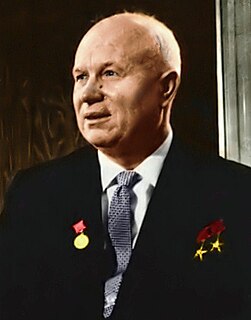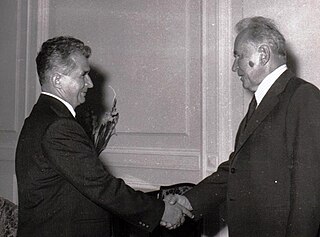Related Research Articles

Leonid Ilyich Brezhnev was a Soviet politician who served as General Secretary of the Communist Party of the Soviet Union between 1964 and 1982 and Chairman of the Presidium of the Supreme Soviet between 1960 and 1964 and again between 1977 and 1982. His 18-year term as General Secretary was second only to Joseph Stalin's in duration. Brezhnev's tenure as General Secretary remains debated by historians; while his rule was characterised by political stability and significant foreign policy successes, it was also marked by corruption, inefficiency, economic stagnation, and rapidly growing technological gaps with the West.

Alexei Nikolayevich Kosygin was a Soviet statesman during the Cold War. He served as the Premier of the Soviet Union from 1964 to 1980 and was one of the most influential Soviet policymakers in the mid-1960s along with General Secretary Leonid Brezhnev.
The "Era of Stagnation" is a term coined by Mikhail Gorbachev in order to describe the negative way in which he viewed the economic, political, and social policies of the Soviet Union that began during the rule of Leonid Brezhnev (1964–1982) and continued under Yuri Andropov (1982–1984) and Konstantin Chernenko (1984–1985). It is sometimes called the "Brezhnevian Stagnation" in English.

The Glassboro Summit Conference, usually just called the Glassboro Summit, was the 23–25 June 1967 meeting of the heads of government of the United States and the Soviet Union—President Lyndon B. Johnson and Premier Alexei Kosygin, respectively—for the purpose of discussing Soviet Union–United States relations in Glassboro, New Jersey. During the Arab–Israeli Six-Day War diplomatic contact and cooperation increased, leading some to hope for an improvement in the two countries' relations. Some even hoped for joint cooperation on the Vietnam War. Although Johnson and Kosygin failed to reach agreement on anything important, the generally amicable atmosphere of the summit was referred to as the "Spirit of Glassboro" and is seen to have improved Soviet–US relations.

The attack on Camp Holloway occurred during the early hours of February 7, 1965, in the early stages of the Vietnam War. Camp Holloway was a helicopter facility constructed by the United States Army near Pleiku in 1962. It was built to support the operations of Free World Military Forces in the Central Highlands of South Vietnam.

The Chairman of the Council of Ministers of the Soviet Union was the head of the government of the Soviet Union during the existence of the Council of Ministers of the Soviet Union from 1946 to 1991.
The former government of Nikita Khrushchev was dissolved following his removal from the post of the Chairman of the Council of Ministers. Alexei Kosygin was elected Premier by the Politburo and the Central Committee following the removal of Khrushchev. His first government would last for two years, until the 1966 Soviet election held in June. Kosygin's first government saw the re-creation of many ministries that were removed under Khrushchev's previous government.
Alexei Kosygin's second government lasted four years, until the 1970 Soviet election held on 14 June. Many new ministries were created under it.

The Presidium of the 22nd Congress of the Communist Party of the Soviet Union (CPSU) was in session from 1961 to 1966. CPSU First Secretary Nikita Khrushchev chaired the Presidium from 1961 to 1964; Leonid Brezhnev succeeded him that year and chaired it until 1966. In contrast to full members, candidate members of the Presidium could not vote during Presidium sessions. It was normal that a full member of the Presidium had previously served as a candidate member, but this was not always the case. During the term 23 people held seats in the Presidium: 14 full members and 9 candidate members. One candidate member was promoted to full membership in the Presidium during the term. Not a single Presidium member died during this period while retaining office.
The former government of Alexei Kosygin was dissolved following the Soviet legislative election of 1974. Kosygin was once again elected premier by the Politburo and the Central Committee following the election. His fourth government lasted for nearly five years, until the 1979 Soviet election.
The former government of Alexei Kosygin was dissolved following the Soviet legislative election of 1979. Kosygin was once again elected Premier by the Politburo and the Central Committee following the election. His fourth government lasted a little over one year due to bad health which led him to resign.
The former government of Alexei Kosygin was dissolved following his resignation in October 1980. Nikolai Tikhonov took over the office of the Premier. The government was dissolved following the nationwide 1984 legislative election.

The 1979 Soviet economic reform, or "Improving planning and reinforcing the effects of the economic mechanism on raising the effectiveness in production and improving the quality of work", was an economic reform initiated by Alexei Kosygin, the Chairman of the Council of Ministers. During Leonid Brezhnev's rule of the Union of Soviet Socialist Republics (USSR) the Soviet economy began to stagnate; this period is referred to by historians as the Era of Stagnation. Even after several reform attempts by Kosygin and his protégés, the economic situation in the country continued to deteriorate. In contrast to his earlier reform initiative, the 26th Congress decided that his government would implement the reform during the Eleventh five-year plan from 1981–1985. This never happened, and even Brezhnev complained that implementation of the reform had been slow. This unfinished reform is seen by some as the last major pre-perestroika reform initiative put forward by the Soviet government.
The history of the Soviet Union from 1964 to 1982, referred to as the Brezhnev Era, covers the period of Leonid Brezhnev's rule of the Union of Soviet Socialist Republics (USSR). This period began with high economic growth and soaring prosperity, but gradually significant problems in social, political, and economic areas accumulated, so that the period is often described as the Era of Stagnation. In the 1970s, both sides took a stance of "detente". The goal of this strategy was to warm up relations, in the hope that the Soviet Union would pursue economic and democratic reforms. However, this did not come until Mikhail Gorbachev took office in 1985.

The Soviet Union–Pakistan relations refers to historical, political, international, and cultural relationships between the state of Pakistan and the Union of Soviet Socialist Republics (USSR). Establishing cultural and bilateral connections between Moscow and Karachi on May 1, 1948, the relations were succeed and predate the post-Soviet Russo-Pakistan relations (1991–present).

The Council of Ministers of the Union of Soviet Socialist Republics, was the de jure government of the Union of Soviet Socialist Republics (USSR), comprising the main executive and administrative agency of the USSR from 1946 until 1991.

The Premier of the Soviet Union was the head of government of the Union of Soviet Socialist Republics (USSR). The office had four different names throughout its existence: Chairman of the Council of People's Commissars (1923–1946), Chairman of the Council of Ministers (1946–1991), Prime Minister and Chairman of the Committee on the Operational Management of the Soviet Economy. Long before 1991, most non-Soviet sources referred to the post as "Premier" or "Prime Minister."
The following lists events that happened during 1978 in the Union of Soviet Socialist Republics.
The following lists events that happened during 1979 in the Union of Soviet Socialist Republics.
The following lists events that happened during 1976 in the Union of Soviet Socialist Republics.
References
- General
- Government of the Soviet Union > List
- "Governments of the Union of Soviet Socialist Republics (1964–1991)". elisa.net. Archived from the original on February 24, 2012. Retrieved September 12, 2010.
- Specific